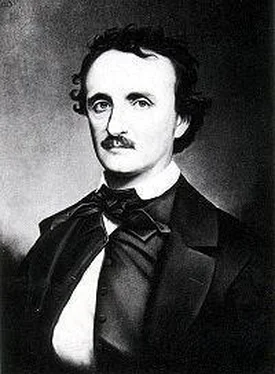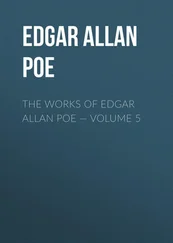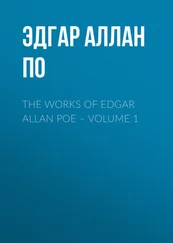Эдгар По - Works of Edgar Allan Poe
Здесь есть возможность читать онлайн «Эдгар По - Works of Edgar Allan Poe» весь текст электронной книги совершенно бесплатно (целиком полную версию без сокращений). В некоторых случаях можно слушать аудио, скачать через торрент в формате fb2 и присутствует краткое содержание. Жанр: Старинная литература, на английском языке. Описание произведения, (предисловие) а так же отзывы посетителей доступны на портале библиотеки ЛибКат.
- Название:Works of Edgar Allan Poe
- Автор:
- Жанр:
- Год:неизвестен
- ISBN:нет данных
- Рейтинг книги:4 / 5. Голосов: 1
-
Избранное:Добавить в избранное
- Отзывы:
-
Ваша оценка:
- 80
- 1
- 2
- 3
- 4
- 5
Works of Edgar Allan Poe: краткое содержание, описание и аннотация
Предлагаем к чтению аннотацию, описание, краткое содержание или предисловие (зависит от того, что написал сам автор книги «Works of Edgar Allan Poe»). Если вы не нашли необходимую информацию о книге — напишите в комментариях, мы постараемся отыскать её.
Works of Edgar Allan Poe — читать онлайн бесплатно полную книгу (весь текст) целиком
Ниже представлен текст книги, разбитый по страницам. Система сохранения места последней прочитанной страницы, позволяет с удобством читать онлайн бесплатно книгу «Works of Edgar Allan Poe», без необходимости каждый раз заново искать на чём Вы остановились. Поставьте закладку, и сможете в любой момент перейти на страницу, на которой закончили чтение.
Интервал:
Закладка:
For several minutes, although he looked me full in the face, he said nothing. At length removing carefully his meerschaum from the right to the left corner of his mouth, he condescended to speak.
"Who pe you," he asked, "und what der teuffel you pe do dare?"
To this piece of impudence, cruelty and affectation, I could reply only by ejaculating the monosyllable "Help!"
"Elp!" echoed the ruffian - "not I. Dare iz te pottle - elp yourself, und pe tam'd!"
With these words he let fall a heavy bottle of Kirschenwasser which, dropping precisely upon the crown of my head, caused me to imagine that my brains were entirely knocked out. Impressed with this idea, I was about to relinquish my hold and give up the ghost with a good grace, when I was arrested by the cry of the Angel, who bade me hold on.
"Old on!" he said; "don't pe in te urry - don't. Will you pe take de odder pottle, or ave you pe got zober yet and come to your zenzes?"
I made haste, hereupon, to nod my head twice - once in the negative, meaning thereby that I would prefer not taking the other bottle at present - and once in the affirmative, intending thus to imply that I was sober and had positively come to my senses. By these means I somewhat softened the Angel.
"Und you pelief, ten," he inquired, "at te last? You pelief, ten, in te possibilty of te odd?"
I again nodded my head in assent.
"Und you ave pelief in me, te Angel of te Odd?"
I nodded again.
"Und you acknowledge tat you pe te blind dronk and te vool?"
I nodded once more.
"Put your right hand into your left hand preeches pocket, ten, in token ov your vull zubmizzion unto te Angel ov te Odd."
This thing, for very obvious reasons, I found it quite impossible to do. In the first place, my left arm had been broken in my fall from the ladder, and, therefore, had I let go my hold with the right hand, I must have let go altogether. In the second place, I could have no breeches until I came across the crow. I was therefore obliged, much to my regret, to shake my head in the negative - intending thus to give the Angel to understand that I found it inconvenient, just at that moment, to comply with his very reasonable demand! No sooner, however, had I ceased shaking my head than -
"Go to der teuffel, ten!" roared the Angel of the Odd.
In pronouncing these words, he drew a sharp knife across the guide-rope by which I was suspended, and as we then happened to be precisely over my own house, (which, during my peregrinations, had been handsomely rebuilt,) it so occurred that I tumbled headlong down the ample chimney and alit upon the dining-room hearth.
Upon coming to my senses, (for the fall had very thoroughly stunned me,) I found it about four o'clock in the morning. I lay outstretched where I had fallen from the balloon. My head grovelled in the ashes of an extinguished fire, while my feet reposed upon the wreck of a small table, overthrown, and amid the fragments of a miscellaneous dessert, intermingled with a newspaper, some broken glass and shattered bottles, and an empty jug of the Schiedam Kirschenwasser. Thus revenged himself the Angel of the Odd.
[Mabbott states that Griswold "obviously had a revised form" for use in the 1856 volume of Poe's works. Mabbott does not substantiate this claim, but it is surely not unreasonable. An editor, and even typographical errors, may have produced nearly all of the very minor changes made in this version. (Indeed, two very necessary words were clearly dropped by accident.) An editor might have corrected "Wickliffe's 'Epigoniad' " to "Wilkie's 'Epigoniad'," but is unlikely to have added "Tuckerman's 'Sicily' " to the list of books read by the narrator. Griswold was not above forgery (in Poe's letters) when it suited his purpose, but would have too little to gain by such an effort in this instance.]
________
The End | Go to top
Edgar Allan Poe: An Appreciation
Caught from some unhappy master whom unmerciful Disaster
Followed fast and followed faster till his songs one burden bore—
Till the dirges of his Hope that melancholy burden bore
Of "never—never more!"
THIS stanza from "The Raven" was recommended by James Russell Lowell as an inscription upon the Baltimore monument which marks the resting place of Edgar Allan Poe, the most interesting and original figure in American letters. And, to signify that peculiar musical quality of Poe's genius which inthralls every reader, Mr. Lowell suggested this additional verse, from the "Haunted Palace":
And all with pearl and ruby glowing
Was the fair palace door,
Through which came flowing, flowing, flowing,
And sparkling ever more,
A troop of Echoes, whose sweet duty
Was but to sing, In voices of surpassing beauty,
The wit and wisdom of their king.
Born in poverty at Boston, January 19 1809, dying under painful circumstances at Baltimore, October 7, 1849, his whole literary career of scarcely fifteen years a pitiful struggle for mere subsistence, his memory malignantly misrepresented by his earliest biographer, Griswold, how completely has truth at last routed falsehood and how magnificently has Poe come into his own, For "The Raven," first published in 1845, and, within a few months, read, recited and parodied wherever the English language was spoken, the half-starved poet received $10! Less than a year later his brother poet, N. P. Willis, issued this touching appeal to the admirers of genius on behalf of the neglected author, his dying wife and her devoted mother, then living under very straitened circumstances in a little cottage at Fordham, N. Y.:
"Here is one of the finest scholars, one of the most original men of genius, and one of the most industrious of the literary profession of our country, whose temporary suspension of labor, from bodily illness, drops him immediately to a level with the common objects of public charity. There is no intermediate stopping-place, no respectful shelter, where, with the delicacy due to genius and culture, he might secure aid, till, with returning health, he would resume his labors, and his unmortified sense of independence."
And this was the tribute paid by the American public to the master who had given to it such tales of conjuring charm, of witchery and mystery as "The Fall of the House of Usher" and "Ligeia"; such fascinating hoaxes as "The Unparalleled Adventure of Hans Pfaall," "MSS. Found in a Bottle," "A Descent Into a Maelstrom" and "The Balloon Hoax"; such tales of conscience as "William Wilson," "The Black Cat" and "The Tell-tale Heart," wherein the retributions of remorse are portrayed with an awful fidelity; such tales of natural beauty as "The Island of the Fay" and "The Domain of Arnheim"; such marvellous studies in ratiocination as the "Gold-bug," "The Murders in the Rue Morgue," "The Purloined Letter" and "The Mystery of Marie Roget," the latter, a recital of fact, demonstrating the author's wonderful capability of correctly analyzing the mysteries of the human mind; such tales of illusion and banter as "The Premature Burial" and "The System of Dr. Tarr and Professor Fether"; such bits of extravaganza as "The Devil in the Belfry" and "The Angel of the Odd"; such tales of adventure as "The Narrative of Arthur Gordon Pym"; such papers of keen criticism and review as won for Poe the enthusiastic admiration of Charles Dickens, although they made him many enemies among the over-puffed minor American writers so mercilessly exposed by him; such poems of beauty and melody as "The Bells," "The Haunted Palace," "Tamerlane," "The City in the Sea" and "The Raven." What delight for the jaded senses of the reader is this enchanted domain of wonder-pieces! What an atmosphere of beauty, music, color! What resources of imagination, construction, analysis and absolute art! One might almost sympathize with Sarah Helen Whitman, who, confessing to a half faith in the old superstition of the significance of anagrams, found, in the transposed letters of Edgar Poe's name, the words "a God-peer." His mind, she says, was indeed a "Haunted Palace," echoing to the footfalls of angels and demons.
Читать дальшеИнтервал:
Закладка:
Похожие книги на «Works of Edgar Allan Poe»
Представляем Вашему вниманию похожие книги на «Works of Edgar Allan Poe» списком для выбора. Мы отобрали схожую по названию и смыслу литературу в надежде предоставить читателям больше вариантов отыскать новые, интересные, ещё непрочитанные произведения.
Обсуждение, отзывы о книге «Works of Edgar Allan Poe» и просто собственные мнения читателей. Оставьте ваши комментарии, напишите, что Вы думаете о произведении, его смысле или главных героях. Укажите что конкретно понравилось, а что нет, и почему Вы так считаете.












